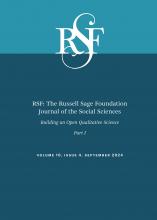Research Article
Open Access
The Political Implications of Economic Lives: Listening to AVP Respondents’ Perceptions of Efficacy
Katherine Cramer, Elizabeth Youngling, Clinton Rooker
RSF: The Russell Sage Foundation Journal of the Social Sciences September 2024, 10 (4) 104-119; DOI: https://doi.org/10.7758/RSF.2024.10.4.05
Katherine Cramer
aNatalie C. Holton Chair of Letters & Science and the Virginia Sapiro Professor of Political Science at the University of Wisconsin-Madison, United States
Elizabeth Youngling
bData and analytics manager for learning and impact at the Chicago Community Trust, United States
Clinton Rooker
cPhD candidate in the Department of Political Science at the University of Wisconsin-Madison, United States

REFERENCES
- ↵
- Abelmann, Nancy
- ↵
- Ahlquist, John S
- ↵
- Almond, Gabriel A., and
- Sidney Verba
- ↵
- Abramson, Corey M.,
- Zhuofan Li,
- Tara Prendergast, and
- Martín Sánchez-Jankowski
- ↵
- Anderson, Elizabeth
- ↵
- Bandura, Albert
- ↵
- Bartels, Larry M
- ↵
- Bourdieu, Pierre
- ↵
- ↵
- Carnes, Nicholas
- ↵
- Casselman-Hontalas, Amy,
- Dominique Adams-Santos, and
- Celeste Watkins-Hayes
- ↵
- ↵
- Condon, Meghan, and
- Matthew Holleque
- ↵
- Craig, Stephen C., and
- Michael A. Maggiotto
- ↵
- Cramer, Katherine J
- ↵
- Dudley, Kathryn Marie
- ↵
- Fujii, Lee Ann
- ↵
- Gamson, William A
- ↵
- ↵
- Gershon, Ilana
- ↵
- Gilens, Martin
- ↵
- Golann, Joanne W
- ↵
- Hacker, Jacob S
- ↵
- Hersh, Eitan
- ↵
- Hochschild, Arlie Russell
- ↵
- Hochschild, Jennifer
- ↵
- Horvat, Erin McNamara,
- Elliot B. Weininger, and
- Annette Lareau
- ↵
- Jack, Anthony Abraham
- ↵
- Jacobs, Lawrence R.,
- Suzanne Mettler, and
- Ling Zhu
- ↵
- Lane, Carrie
- ↵
- Lane, Robert
- ↵
- Lareau, Annette
- ↵
- Levin, Ines,
- J. Andrew Sinclair, and
- R. Michael Alvarez
- ↵
- ↵
- Lindh, Arvid, and
- Leslie McCall
- ↵
- Lippmann, Walter
- ↵
- Lipset, Seymour Martin
- ↵
- ↵
- Mettler, Suzanne, and
- Joe Soss
- ↵
- Miller, Arthur H.,
- Patricia Gurin,
- Gerald Gurin, and
- Oksana Malanchuk
- ↵
- Mutz, Diana C
- ↵
- Newman, Katherine
- ↵
- Parker, Danny
- ↵
- Rodrik, Dani
- ↵
- Rogers, Reuel
- ↵
- Rosenstone, Steven J
- ↵
- Roy, Amanda L.,
- C. Cybele Raver,
- Michael D. Masucci, and
- Meriah DeJoseph
- ↵
- Schlozman, Kay Lehman,
- Henry H. Brady, and
- Sidney Verba
- ↵
- Schlozman, Kay Lehman, and
- Sidney Verba
- ↵
- Schumpeter, Joseph
- ↵
- Schwartz-Shea, Peregrine, and
- Dvora Yanow
- ↵
- Soss, Joe
- ↵
- Soss, Joe
- ↵
- Soss, Joe, and
- Vesla Weaver
- ↵
- Stone, Deborah A
- ↵
- Valentino, Nicholas A.,
- Krysha Gregorowicz, and
- Eric W. Groenendyk
- ↵
- Ver Ploeg, Michele,
- Robert A. Moffitt, and
- Constance F. Citro
- ↵
- Verba, Sidney,
- Kay Lehman Schlozman, and
- Henry Brady
- ↵
- Wolak, Jennifer
- ↵
- Wuepper, David, and
- Travis J. Lybbert
- ↵
- Zilberstein, Shira,
- Elena Ayala-Hurtado,
- Mari Sanchez, and
- Derek Robey
In this issue
The Political Implications of Economic Lives: Listening to AVP Respondents’ Perceptions of Efficacy
Katherine Cramer, Elizabeth Youngling, Clinton Rooker
RSF: The Russell Sage Foundation Journal of the Social Sciences Sep 2024, 10 (4) 104-119; DOI: 10.7758/RSF.2024.10.4.05
Jump to section
Related Articles
- No related articles found.
Cited By...
- No citing articles found.





